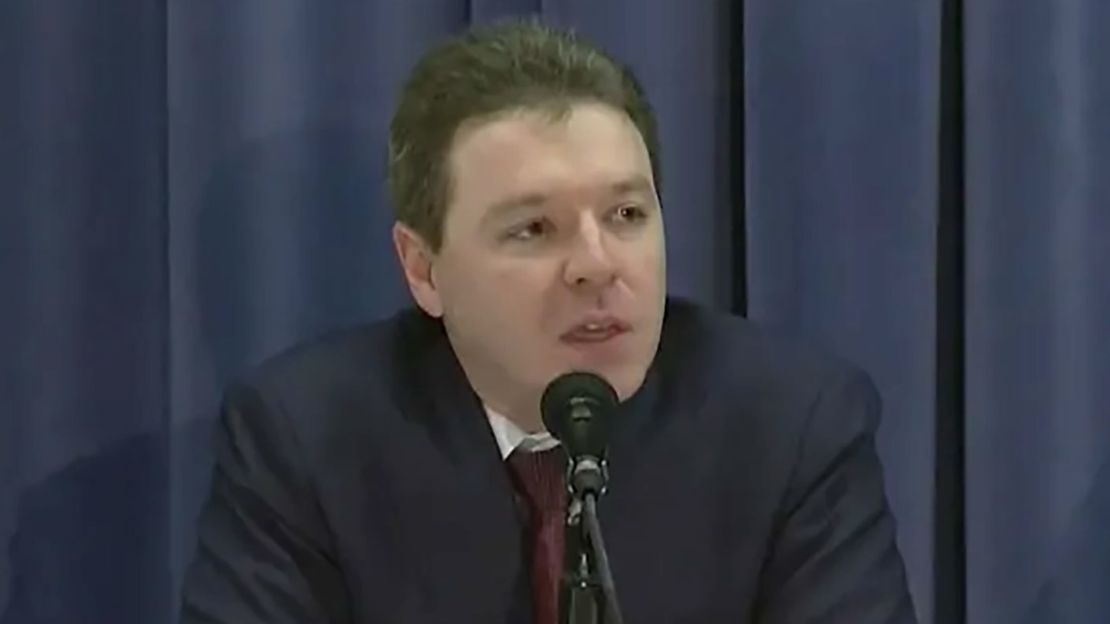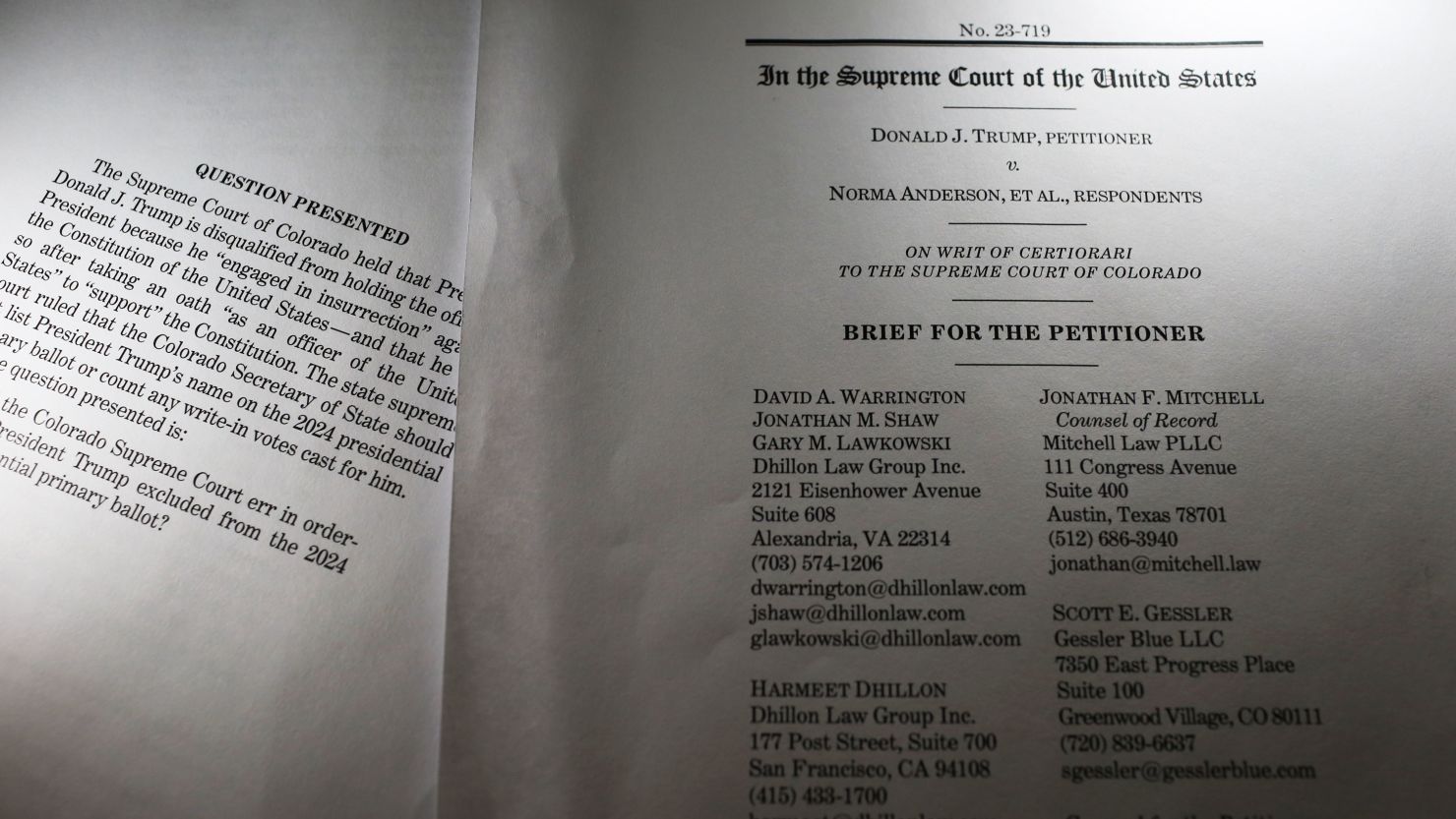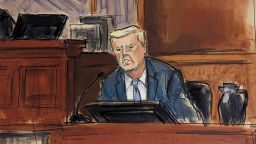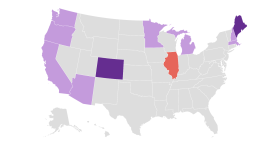As Donald Trump wages a Supreme Court battle to stay on state presidential ballots, a potent contingent of the conservative legal world has united behind him.
His new principal attorney for the case, Jonathan Mitchell, is a former Supreme Court clerk connected to the right-wing elite who devised the 2021 Texas abortion ban that helped lead to reversal of the Roe v. Wade landmark decision. The Texas law, which included a shrewd mechanism impeding judicial review, prompted liberal Justice Elena Kagan to refer disparagingly to its masterminds as “some geniuses.”
Also backing Trump, with “friend of the court” briefs, are the Republican National Committee and GOP establishment forces, similarly represented by elite appellate advocates who’ve worked for the justices and speak their language. They include former Trump Solicitor General Noel Francisco, George W. Bush-era legal adviser John Yoo and other ex-clerks of conservative Justices Antonin Scalia and Clarence Thomas.
The leading Republican presidential candidate appears to be benefitting from ideological kinship, and perhaps personal loyalty, in the case that arose in Colorado but will have nationwide implications for the November general election.
The new filings in the case of Trump v. Anderson also reinforce the tight world of Supreme Court lawyering. From the start, the Colorado voters trying to keep Trump off the ballot, and who won at the state Supreme Court level, have been represented by former US Supreme Court clerks who’ve become prominent advocates.
The arguments tied to an anti-insurrectionist safeguard in the Constitution are scheduled for February 8 and bound to be hard fought and high energy. Given the GOP-appointed conservative dominance of the bench, the Trump side could find more allies in the give-and-take.
In his brief, Mitchell cited Thomas, whose influence has grown with the addition of more conservative colleagues in recent years. Mitchell highlighted what he insisted was the proper textualist reading of the disputed constitutional provision. Lawyers for the Republican National Committee similarly emphasized textualist arguments, repeatedly citing the late Justice Scalia, a prominent disciple of the textualist mode of legal interpretation.
At the lectern opposing Mitchell, who clerked for Scalia two decades ago, will be Jason Murray, a more recent law clerk to Justice Kagan. Murray’s partners in the case, Eric Olson and Sean Grimsley, who argued in Colorado lower courts, served as law clerks to the late Justices John Paul Stevens and Sandra Day O’Connor, respectively.
They, and their side’s “friend of the court” briefs, have until January 31 to respond to the Trump arguments. Based on the Colorado challengers’ preliminary submission to the high court, they will likely try to turn the justices’ attention to what happened on January 6, 2021, when Trump sought to overturn the election results that legitimately gave Joe Biden the White House.
Referring to the findings of a Colorado trial court judge, the lawyers wrote that Trump caused “the insurrection on January 6, 2021, having intentionally incited the mob to violence in a desperate ploy to cling to power.”
Is the president an officer of the United States?
The former president is urging the justices to overturn the Colorado Supreme Court decision that said he should be disqualified from the state ballot for his role in the attack on the US Capitol based on the Constitution’s 14th Amendment.
Adopted after the Civil War and aimed at former Confederate leaders, Section 3 says, “No person shall … hold any office … under the United States … who, having previously taken an oath, as a member of Congress, or as an officer of the United States … to support the Constitution of the United States, shall have engaged in insurrection or rebellion against the same, or given aid or comfort to the enemies thereof.”
Mitchell opened his arguments with the assertion that the president is not an “officer” of the United States, as the term is used in the Constitution, and therefore not covered by Section 3. (This theory was adopted by the Colorado trial judge but rejected by the state Supreme Court, which found it “inconsistent with the plain language and history of Section 3.”)
Mitchell highlighted oaths that are separately delineated in the Constitution and taken by the president and other top officials. “The president swears a different oath set forth in Article II, in which he promises to ‘preserve, protect, and defend the Constitution of the United States’ — and in which the word ‘support’ is nowhere to be found,” Mitchell wrote.
Focusing on the specific words of the text, he told the justices, “Section 3’s disqualification can apply only to those who have ‘previously taken an oath, as a member of Congress, or as an officer of the United States, or as a member of any State legislature, or as an executive or judicial officer of any State, to support the Constitution of the United States.’ It is undisputed that President Trump never took such an oath.”
Trump’s lawyers also are arguing that Section 3 applies only to a person who would “hold” office, not “run” for office. That contention has been endorsed in court brief by Francisco on behalf of the National Republican Senatorial Committee.
A group of former Republican attorneys general, which includes William Barr, Michael Mukasey and Edwin Meese, is also emphasizing that Section 3 does not cover the president, even as the group subtly acknowledges the national divisions arising from the attack on the Capitol.
In their interpretation of Section 3, they say, “The text speaks to a hierarchy of public offices in descending rank order, and its reference to an ‘officer of the United States’ low in that hierarchical list cannot include a President because an office ‘under the United States’ and ‘officer of the United States’ did not include the presidency as those terms were historically understood.”
The former attorneys general add, “Whatever one thinks of President Trump’s behavior on January 6, 2021, the stakes in this case are much larger than any one candidate or election. The overriding question is whether the Court will interpret Section 3 in a way that would henceforth empower partisan officials to unilaterally disqualify their political opponents from the ballot, especially the presidential ballot.”
Mitchell drawn to culture war issues
Mitchell was already scheduled to make an appearance at the high court in February.
He will argue on behalf of a gun owner on February 28 in a dispute over government-banned bump stocks, devices that augment semiautomatic rifles to fire hundreds of bullets a minute.
After his clerkship, Mitchell became a lawyer in the George W. Bush administration’s Office of Legal Counsel and taught law school, including at the University of Chicago, where he had earned a law degree. He served as Texas state solicitor general from 2010 to 2015.

Recalled by colleagues over the years as smart but somewhat eccentric, Mitchell, now 47, seemed destined to become a solo operator. He opened his own firm in 2018. Mitchell has gravitated to culture-war issues, notably against reproductive rights and LGBTQ interests.
During the Colorado proceedings, Trump was represented by Scott Gessler, a Republican lawyer and former Colorado secretary of state, and the Dhillon Law Group, which has shepherded other Trump litigation related to January 6.
As Mitchell has taken over the Supreme Court appeal, he has focused Trump’s legal attack, eliminating some arguments and leading with the claim that the president is simply not an “officer of the United States” covered by the anti-insurrectionist provision.
For Supreme Court justices, reviewing the Trump arguments and soon-to-be-filed responses from the Colorado challengers, they are likely in only the first chapter of litigation related to the former president this election year.
Among the other controversies on the near horizon is whether Trump can claim immunity from criminal prosecution for election subversion related to the 2020 presidential contest.
Special counsel Jack Smith had tried to persuade the court to hear arguments related to the immunity claim, well in advance of a scheduled March trial for Trump. The justices spurned the December request, and as a result a US appellate court heard arguments on January 9 over whether Trump should be shielded for alleged crimes while in office.
A decision could come any day, and when that happens, the case of United States v. Trump would, no doubt, return to the justices.






